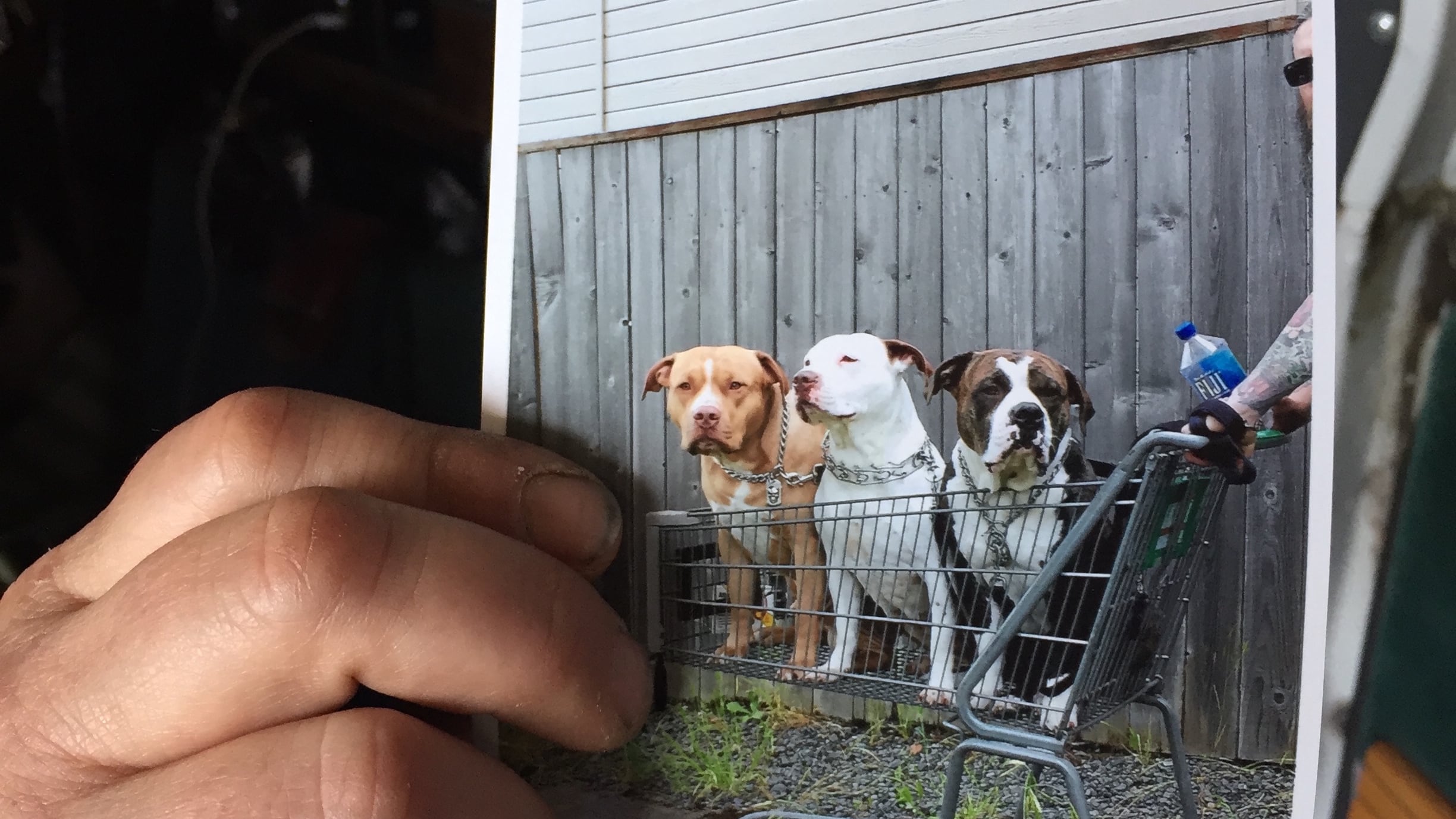You're not paranoid: The number of Portland dogs with homeless owners is growing rapidly. Local animal hospital Dove Lewis says the number of homeless people getting veterinary care for their dogs has doubled in the past two years.
That's because the animals provide emotional support and four-legged security for people on the streets.
"[Dogs] kind of flip a switch in some people," says Kathy Loter, program manager for the Portland Area Canine Therapy Teams program. "It's like a reset button. When people are experiencing such great loss and struggle, to have a dog with you is an amazing thing."
Take Michael, who says his dog saved him from a beating.
"He was a rescue pup and he rescued me at the same time," says Michael of his lap dog, Buddy Love. Michael says Buddy was hurt while protecting Michael from an abusive ex-partner. Michael didn't share specifics in May along the I-205 multiuse path, north of the Springwater Corridor, where he and Buddy Love camped last summer. But the bond was clear.
"He keeps me grounded, and gives me a lot of hope," Michael said. "He's the love of my life."
Yet the chaos, mental illness and drug use on the streets can also create situations that put animals, and the public, in harm's way.
On March 8, after a dog attacked a city employee, Eugene's city council passed a temporary ordinance banning dogs from its downtown unless owners have "lawful residence within the restricted area."
Portland hasn't considered any such rules. But plenty of homeless people have stories about their dogs meeting bad ends.
Leslie Preston's pit bull, Blue Dozer, was shot and killed by Portland police in September 2016. In early June, Blue Dozer's ashes sat in a box on the dashboard of a van under a bridge in the Hollywood neighborhood. A shrine for Blue Dozer was nearby.
Police said the dog attacked officers responding to a domestic violence call on the streets of the Hollywood neighborhood. Preston disputes that, saying police shot him "because he was a pit bull. He was leashed, with his service vest on, when he was shot," she says.
Andy Olive lost his black lab, Brutus, after he bit a cop five years ago. On June 18, Olive was living in a tent near St. Francis of Assisi Church in the Buckman neighborhood. He's been on the streets for 23 years—using heroin for 20—but he paused when Brutus came up.
"The pound came and euthanized him," Olive said, his expression wistful.
Homeless people say they typically obtain their animals the same way anybody else does—free or for a few bucks via friends, family or adopting from a no-kill shelter. And numerous Portland organizations help take care of the pooches.
The Portland Animal Welfare Team has seen a "huge increase in the number of homeless people we serve," interim executive director Maia Shwartz says. The team offers free veterinary exams, vaccinations, microchips, and licenses to owners who meet income standards.
The majority of homeless owners take care of their dogs, Shwartz says. But some won't—or can't—follow basic rules like local leash laws.
"This one woman, she comes in literally every Thursday to get a leash," Shwartz says. "We had to have a serious talk with her. She lives in a tent, right outside of our offices. And she's definitely a substance abuser, and it's just not something she thinks about until somebody asks her to put her dog on a leash."
Kenny Hagman, 51, interviewed in May while camping along the I-205 bicycle path, feeds his fluffy Pomeranian, Mister, by dumpster diving for 50-pound sacks of dog food outside pet stores. "They rip a sack, they throw it away," he shrugs.
Mister keeps him sane, he says. "Mister brings me up—he keeps me out of the distressed mode."
Mister also travels well on Hagman's bicycle trailer—which can be important for unsheltered people who have to move frequently. "I just tell him to load up, and he jumps on, sits down, and waits to go," Hagman says.
On June 14, Hagman was bicycling up and down the I-205 path, gathering information about official cleanups happening near Southeast Flavel Street. Mister stood at alert, nose to the wind. As they passed, several waved and smiled. "Hi Mister!" yelled one woman as she packed her tent near trucks with flashing lights.
"He's been out here since the day he was born," Hagman said with a shrug.


